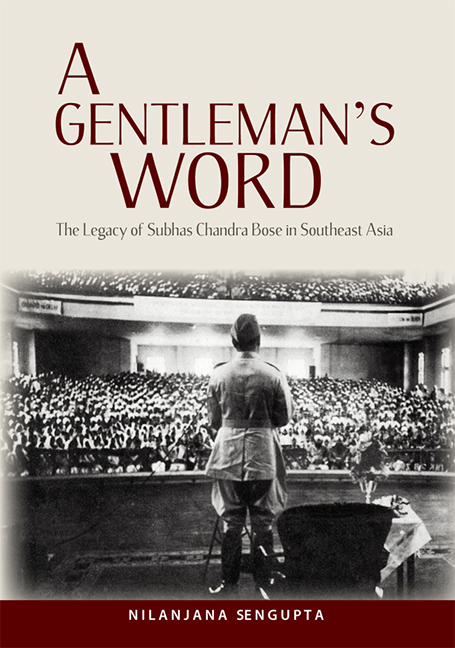Book contents
- Frontmatter
- Dedication
- Contents
- Foreword by S. R. Nathan
- Message by K. Kesavapany
- Message by Joyce C. Lebra
- Preface
- Acknowledgements
- 1 A Journey: A Dream
- 2 An Outsider in the Crescent and a Trial for Treason
- 3 End of a War, Beginning of Others
- 4 We are the Multitudes
- 5 “They Have Done Enough at Home”: Escape from the Shadows
- Bibliography
- Index
- About the Author
- Plate Section
3 - End of a War, Beginning of Others
Published online by Cambridge University Press: 21 October 2015
- Frontmatter
- Dedication
- Contents
- Foreword by S. R. Nathan
- Message by K. Kesavapany
- Message by Joyce C. Lebra
- Preface
- Acknowledgements
- 1 A Journey: A Dream
- 2 An Outsider in the Crescent and a Trial for Treason
- 3 End of a War, Beginning of Others
- 4 We are the Multitudes
- 5 “They Have Done Enough at Home”: Escape from the Shadows
- Bibliography
- Index
- About the Author
- Plate Section
Summary
“Though the days of the hero are o'er,
… He returns to Kinkora no more.
That star of the field, which so often hath pour'd
Its beam on the battle, is set;
But enough of its glory remains on each sword,
To light us to victory yet.”
— War Song, Thomas MooreREPRESENTATIVE TENETS OF THE INA
The INA — Mercenaries or Patriots?
One of Krishna Bose's books, Charana Rekha Taba [In Your Footsteps] — which is a travelogue that doubles up as a historical narrative as the author traces Subhas Chandra Bose's footsteps across East Asia — recounts a rather memorable incident. The event occurred at Formosa (Taiwan). Bose was travelling to Tokyo, en route to possibly the Soviet Union on 17 August 1945. The Japanese Air Force bomber halted at the Taipei airport for refuelling. The engine of the aircraft had been giving trouble and soon after the plane was airborne again, there was a loud explosion and it tilted to the left and eventually crashed not far from the runway. The front of the plane caught fire and Bose and his sole Indian companion, Colonel Habibur Rahman, were badly burned. They pushed their way through the fire in the front because the way out towards the rear was already blocked. As the two men struggled out of the aircraft and lay down on the grass — exhausted and in intense pain, Bose turned towards his long-time friend and compatriot and asked in Hindustani, “Aap ko zyada to nahin lagi?” [Hope you are not too badly hurt?] Incidents such as these, when Bose expressed genuine concern for his colleagues are many; but this one, played out under a foreign sky, hours before he was to breathe his last, is perhaps the most poignant.
Another incident is narrated by Colonel Prem Kumar Sahgal, Military Secretary of the INA who, in the course of events, was tried for treason at the Red Fort. It was towards the end of battle in Burma, when the defeat of the Japanese and the INA loomed large on the horizon. The actual withdrawal from the war-front began on 9 April 1945. Units of No. 4 Guerilla Regiment were the first to withdraw. But on the morning of the 11th, British forces occupied Kyak-Padauo and the INA's direct line of retreat was cut off.
- Type
- Chapter
- Information
- A Gentleman's WordThe Legacy of Subhas Chandra Bose in Southeast Asia, pp. 93 - 165Publisher: ISEAS–Yusof Ishak InstitutePrint publication year: 2012

